Enslaved to the Jesuits: What Women of the First U.S. Diocese can tell us about Women in the Church
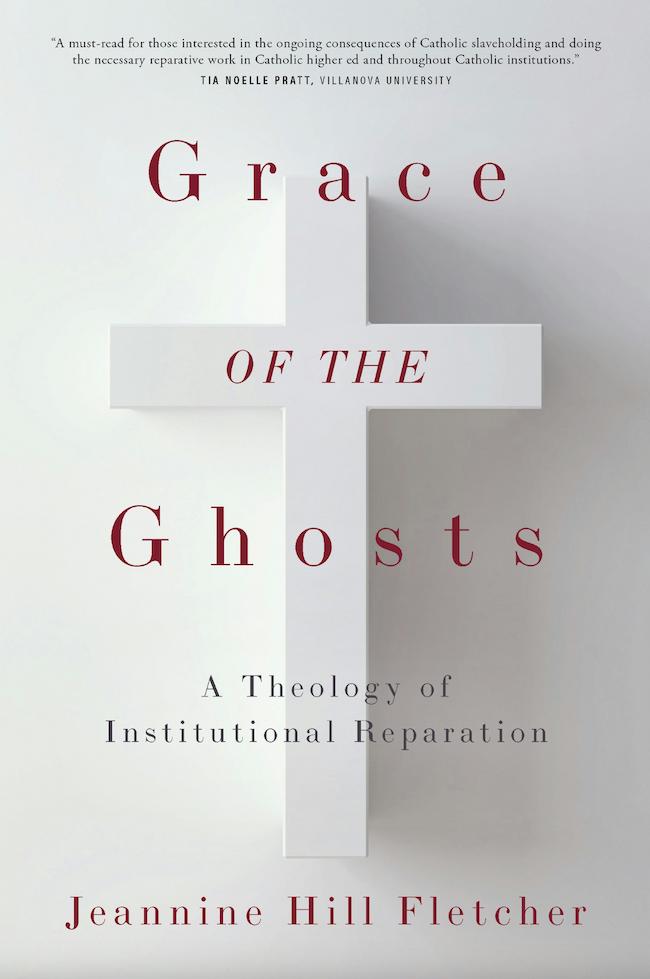
Inaugural Nancy Marzella Lecture on Women and American Catholicism
Jeannine Hill Fletcher
Fordham University
Date: Tuesday, March 25, 2025
Time: 5:30 - 7pm
Location: Devlin Hall 101
RSVP's Requested - Sign up Here
Boston College Bookstore will be onsite selling copies of Grace of the Ghosts: A Theology of Institutional Reparation.
Women enslaved on Jesuit plantations were among the first women of the American Catholic Church. Our investigation will explore what we can know about these women, the various roles they played in ecclesial life and institution building, and their struggles for freedom. Special attention will be given to Nelly and Louisa Mahoney, and other women who encountered John McElroy, S.J., founder of Boston College. Recognizing patterns of practice that endure, we’ll also ask what our foremothers in the faith might tell us about women in Catholicism today.
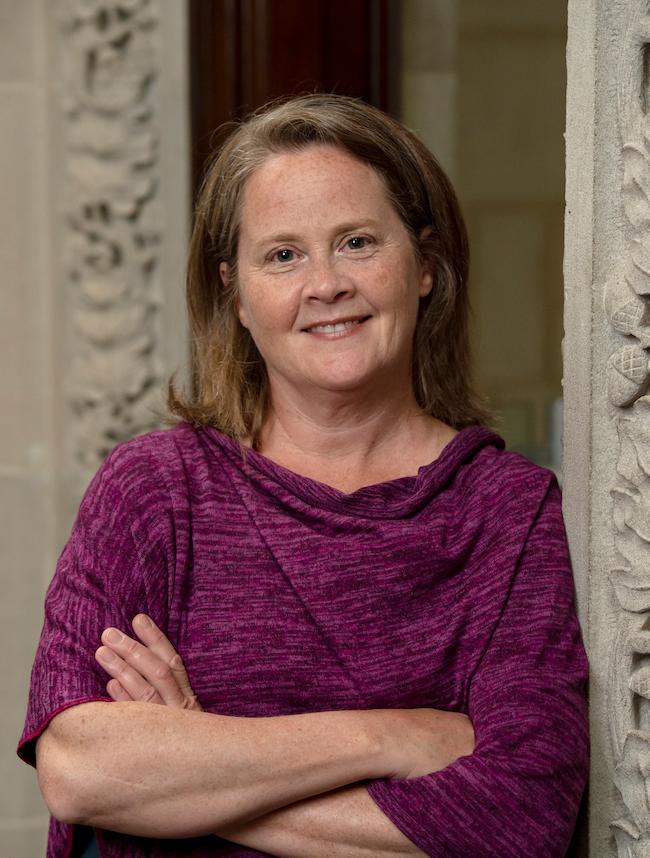
Jeannine Hill Fletcher is a constructive theologian writing at the intersection of Catholic systematic theology and issues of diversity (including gender, race and religious diversity). She is the author of, The Sin of White Supremacy: Christianity, Racism and Religious Diversity in America (Orbis, 2017). As professor of theology at Fordham University, Bronx NY, she also serves on the board of the Northwest Bronx Community and Clergy Coalition, an inter-generational, multi-racial, multi-religious grassroots organization committed to racial justice and economic democracy in New York City and beyond. Her new book, entitled, Grace of the Ghosts: A Theology of Institutional Reparation, is forthcoming in Spring 2025.
Clark, Emily, and Virginia Meacham Gould. “The Feminine Face of Afro-Catholicism in New Orleans, 1727-1852.” The William and Mary Quarterly 59, no. 2 (2002): 409-48. https://doi.org/10.2307/3491743.
Gollar, C. Walker. “Let Us Go Free”: Slavery and Jesuit Universities in America. Washington: Georgetown University Press, 2023.
Hill Fletcher, Jeannine. Grace of the Ghosts: A Theology of Institutional Reparation. New York: Fordham University Press, 2025.
Mendoza, Elsa B. “Enslaved on Campus: Displaced Lives, Families, and Religion at Georgetown College.” Slavery & Abolition 44, no. 1 (2022): 48-68. https://doi:10.1080/0144039X.2022.2131397.
Nalezyty, Susan. “The History of Enslaved People at Georgetown Visitation.” U.S. Catholic Historian 37, no. 2 (2019): 23-48. http://www.jstor.org/stable/45186158.
Rothman, Adam. “Georgetown University and the Business of Slavery.” Washington History 29, no. 2 (2017): 18-22. http://www.jstor.org/stable/90015020.
Schmidt, Kelly L. “A National Legacy of Enslavement: An Overview of the Work of the Slavery, History, Memory, and Reconciliation Project.” Journal of Jesuit Studies 8, no. 1 (2020): 81-107. https://doi.org/10.1163/22141332-0801P005.
Swarns, Rachel L. The 272: The Families Who Were Enslaved and Sold to Build the American Catholic Church. New York: Random House, 2023.
Thompson, Margaret S. “Discovering Foremothers: Sisters, Society, and the American Catholic Experience.” U.S. Catholic Historian 5, no. 3/4 (1986): 273-90. http://www.jstor.org/stable/25153765.
As many gather for prayer and penance during this Lenten season, a significant number of Catholic women frustrated with the state of the Church have decided to protest by abstaining from certain aspects of ecclesial life, such as attending Mass and being involved in ministries like choirs and volunteer programs. Women in the Catholic Church make up around 80% of lay ecclesial ministers. The National Catholic Reporter recently published an article detailing some of the grievances that have weighed heavily on Catholic women in recent decades. When Pope Francis called together Church leaders for the Synod on Synodality, many were hopeful that this would be a step toward more access to leadership roles such as the diaconate or priesthood for women. Disappointment followed, as these issues were not brought to the table at the historic meetings. Dr. Jeannine Hill Fletcher focuses on the historical contributions of Black women to the Church, and her lecture will add to our understanding of the role that women have played in shaping the Catholic community throughout its history.
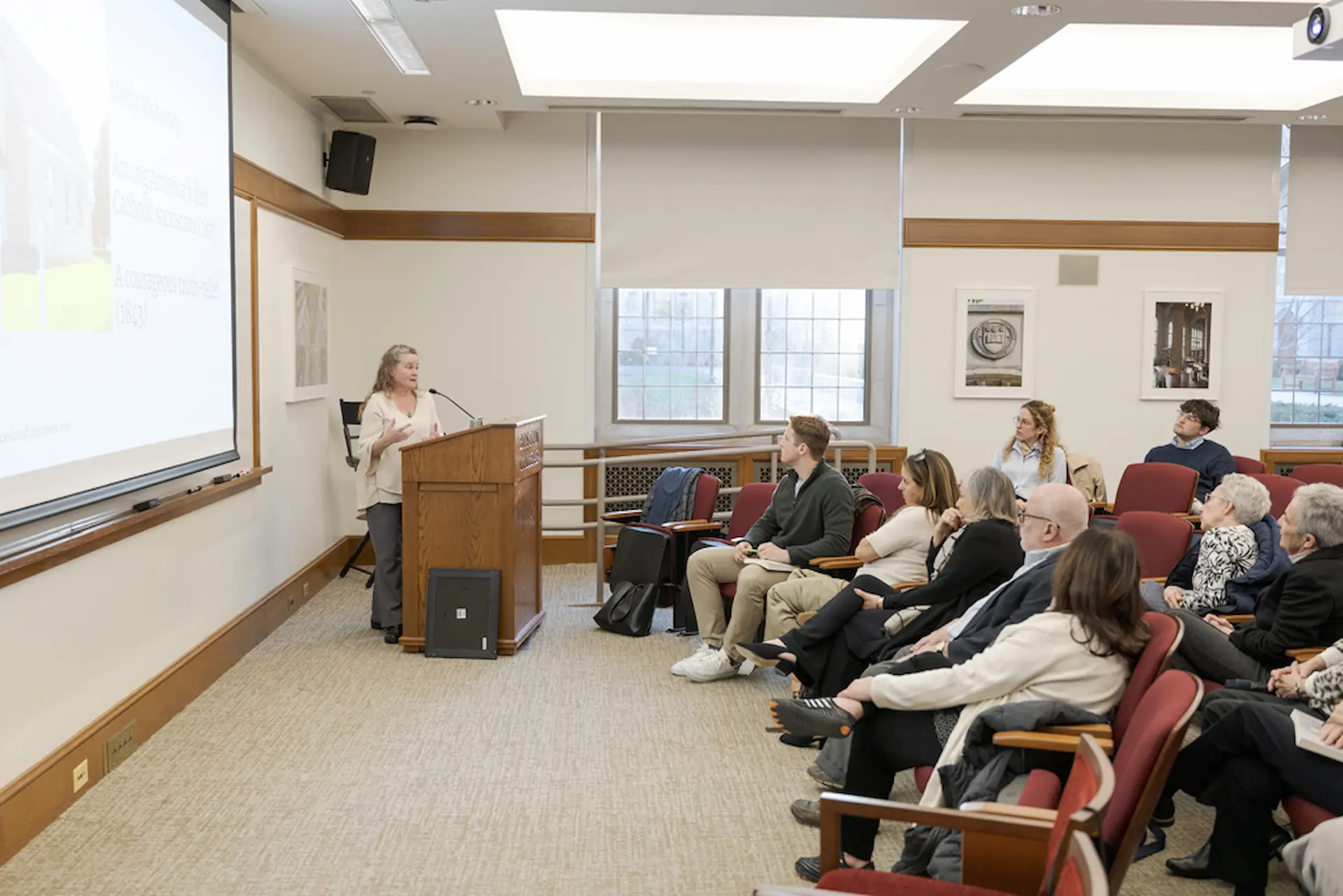
The Inaugural Nancy Marzella Lecture on Women and American Catholicism is delivered by Dr. Jeannine Hill Fletcher.
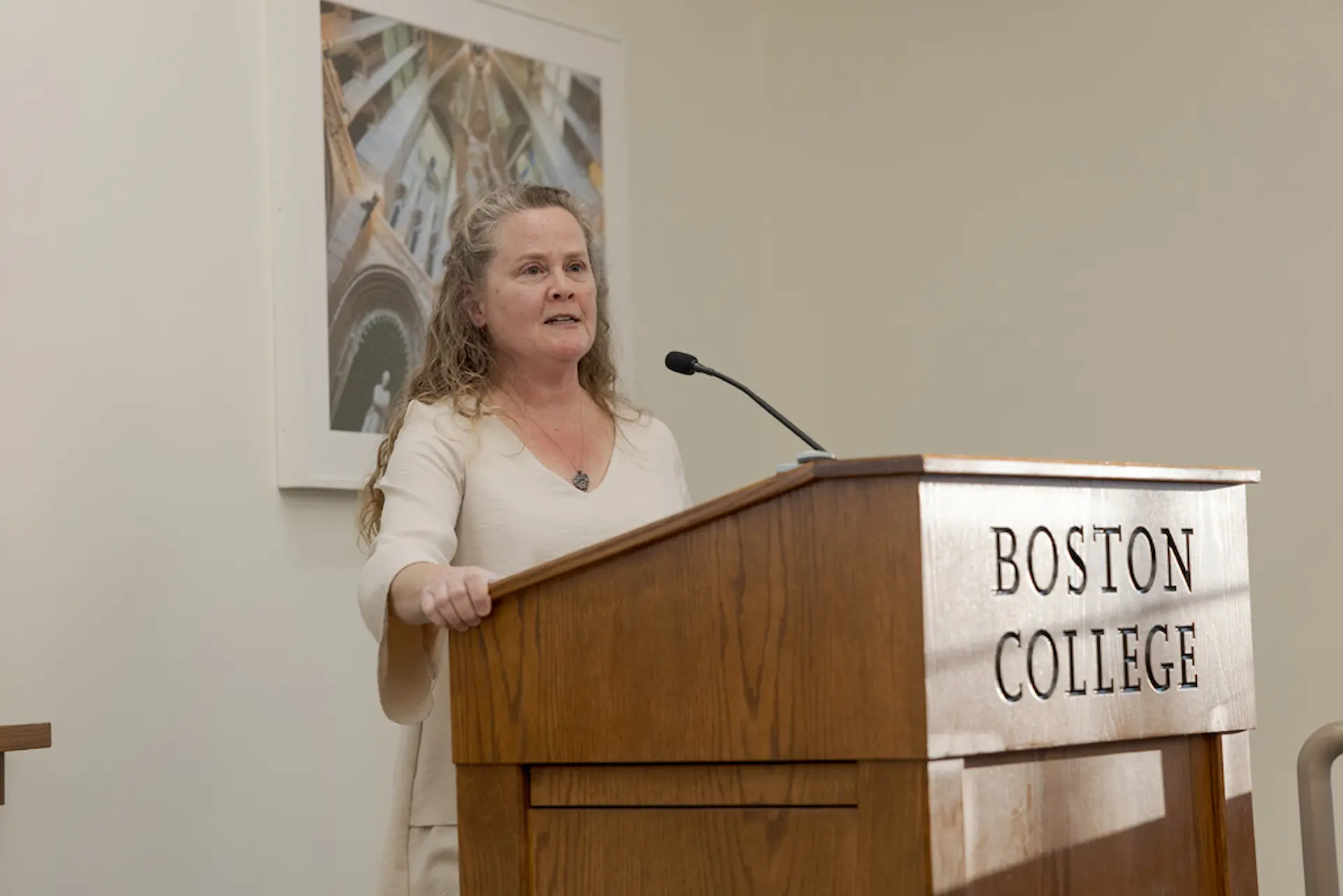
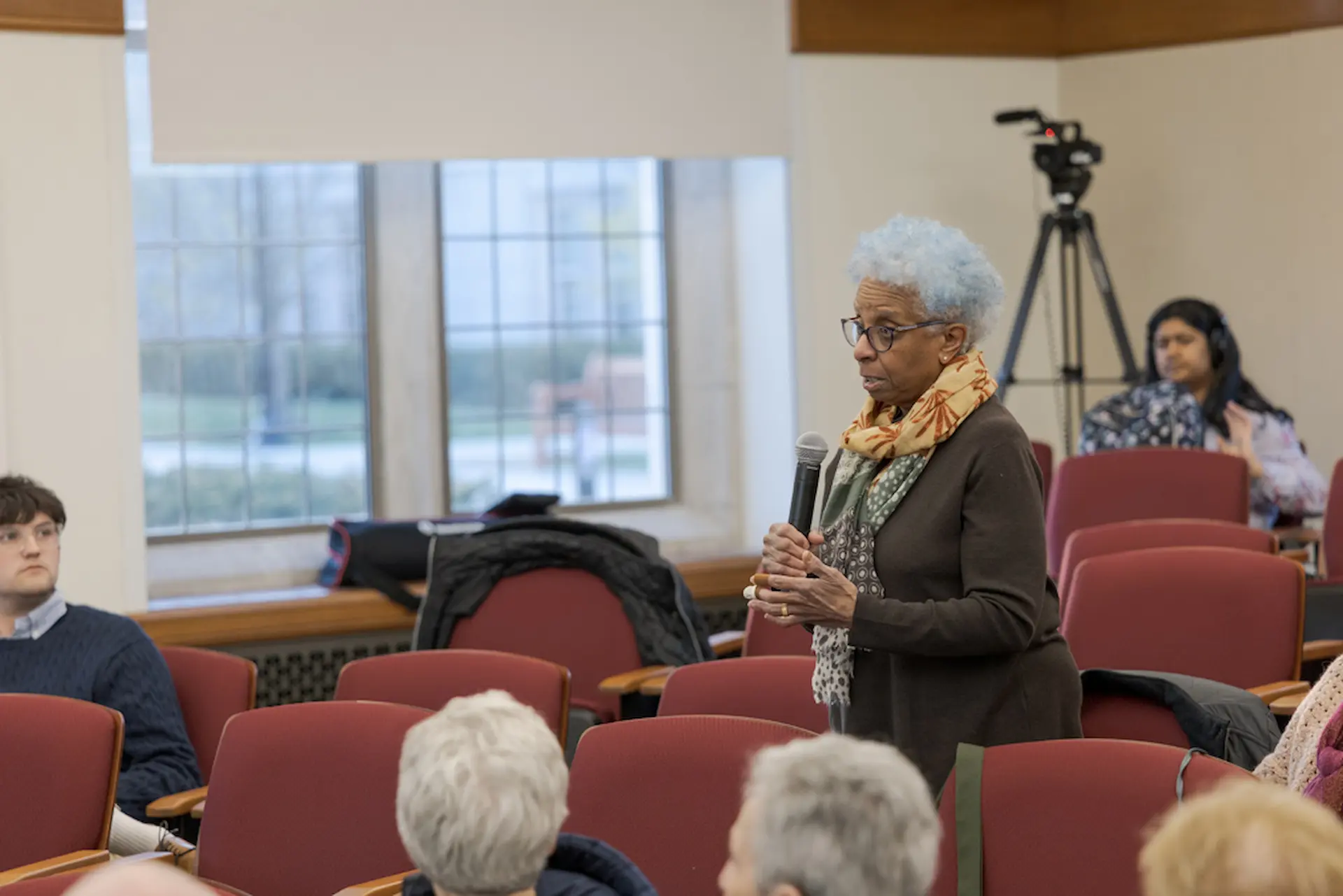
Dr. Jeannine Hill Fletcher quoted Boston College Professor Emerita from the theology department M. Shawn Copeland, who also happened to be in the audience.
Photo credits: Christopher Soldt, MTS
Dr. Jeannine Hill Fletcher, professor of theology at Fordham University, set a high bar as the inaugural presenter in the Nancy Marzella Lecture Series on Women and American Catholicism. The event kicked off with Hill Fletcher’s son, Owen, introducing the renowned theologian who he calls mom. Hill Fletcher’s research seeks to uncover the earliest accounts of Catholic women in the United States, and her lecture focused on the story of one woman in particular, Nelly Mahoney, a Black woman enslaved to the Jesuits in Maryland.
Hill Fletcher emphasized that Nelly’s story is not just the story of one of the first 35,000 Catholics in the nation, but also an incredibly important part of how women can begin to be viewed as shapers of Catholic history. Women were partners in the work of the Church, and the male-centered narrative that is often told does not account for this. By taking a critical account of different histories (including that of Nelly) and by reading the writings and silences of the Jesuits, the stories of the past can be more accurately reconstructed.
Though Catholics dominated the early history of the Province of Maryland, Baltimore and the surrounding areas became much more Protestant over time and would no longer allow for the indentured servants on which the Jesuits relied. The Order then turned to slavery and eventually, the Jesuits operated plantations that were over 1,000 acres large and owned hundreds of enslaved people. Nelly was one of them. During her enslavement, she served as a sacristan at St. Inigoes parish and showed creativity in tending to the holy work of the Church. Nelly is recorded as being an intelligent and religious woman. In a world that denied her humanity, she affirmed it through faith, prayer, and involvement in her parish community.
By the mid-1830’s, slavery became less profitable for the Jesuits, and they shifted resources away from plantations to Georgetown. The modern university secured its protection by profiting off the sale of enslaved people to Louisiana. Many of Nelly’s family members were unwillingly part of this deal. Nelly serves as a center point of debate between Jesuits about the sale. She was present during some of these discussions and even debated with select Jesuits about the morality of the sale.
Nelly’s story serves as an example of the way the histories of these enslaved women can be told, and it represents the beginning of the story of women in the American Catholic Church. The narrow scope of Church history can be expanded and modern issues can be addressed more fully with accounts like these. In her lecture and the engaging Q&A, Hill Fletcher left the audience with this message: a history that erases theft of life and wealth is unacceptable, and it implies that some Catholics are more valuable than others. A full history is needed to continue repairing the damage caused centuries ago. She remains hopeful that Nelly’s story will become one of many that uncover the important role that women have played in shaping the American Catholic Church.

